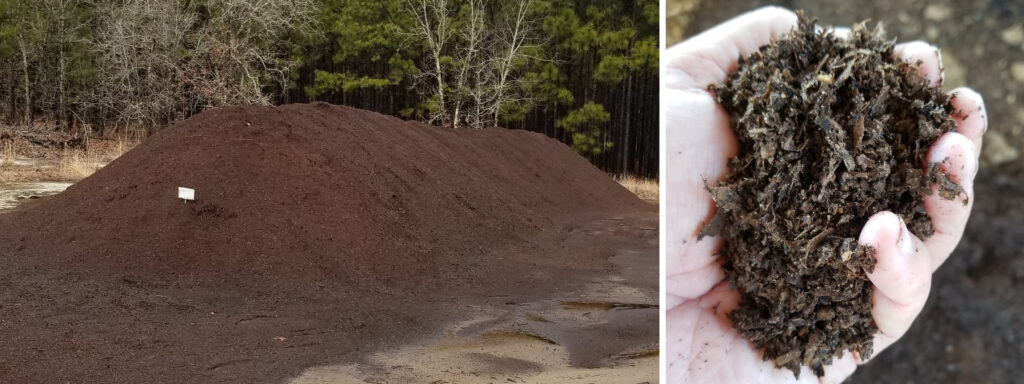Sand Stone Farms Turns Turkey Litter into Quality Compost

Fertile Ground
Sand Stone Farms Turns Turkey Litter into Quality Compost
By Eva Moore | Photos courtesy Michael Stone
This story appears in the April 1, 2021 issue of the South Carolina Market Bulletin.
Michael Stone didn’t set out to start a compost business. But now that he has, he’s doing it right.
Stone is a contract turkey grower, raising turkey chicks from birth to 5 weeks of age. Every five weeks, he cleans out his turkey sheds. He used to sell the turkey litter – a combination of wood chips and turkey manure – to a litter broker who would resell it to other farmers. But then the broker’s business ended.
“He lost his license and I was suddenly stuck with the litter out of the barns and no way to really handle it,” Stone says.
After consulting with a manure management specialist at Clemson, Stone decided to compost the litter himself. He’s now permitted through the state Department of Health and Environmental Control as a producer of “exceptional quality compost,” and Clemson certifies his compost for organic production.
Because of his frequent flock turnover and cleaning schedule, his turkey barns supply litter that’s just right for composting.
“Anytime you’re dealing with manure, if you have too much, you can burn plants because the nitrogen is way too high,” he explains. “You need a proper mixture of carbon and nitrogen to compost.
“I also raise horses. If I were to take horse manure and put it in the garden, it’s just going to burn that garden up. I would have to add bulking agents – wood chips, straw, hay – to the compost. But it just so happens that the turkey litter comes out of the barn ready to go with the right mixture of carbon and nitrogen.”
Business is expanding quickly, says Stone, simply through word of mouth. His customers are mostly landscapers, home gardeners, and local retail shops. He’s about to begin bagging his Sand Stone Farms compost for retail sale, and by the end of year, plans to expand to products made with compost like a potting mix and a succulent mix.
He also uses the compost to grow vegetables on his own farm. It’s helping him improve the soil there long term.
“As you know, in the Midlands of South Carolina, there’s no such thing as soil, just sand,” he jokes. “Our compost on average is about 63 percent organic matter, so every time I add it to the sand I have, I’m putting organic matter back into the soil. That helps the soil maintain moisture, helps with runoff. It’s what anyone wants in a soil.”
Like what you see? Subscribe to the Market Bulletin here for just $15 a year.
